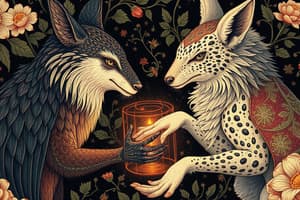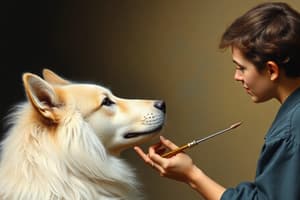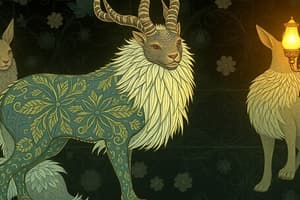Podcast
Questions and Answers
What is one of the main focuses of ethologists in studying animal behavior?
What is one of the main focuses of ethologists in studying animal behavior?
- To categorize all animal behaviors into a single framework
- To discover the stimuli that trigger specific behaviors (correct)
- To understand how animals behave in lab settings
- To analyze how behaviors are shaped solely by genetics
How might behaviors evolve according to the principles of natural selection?
How might behaviors evolve according to the principles of natural selection?
- Behaviors that decrease fitness are likely to persist
- Behaviors are determined purely by environmental factors without genetic influence
- Genetically controlled behaviors may become more common if they increase fitness (correct)
- Behaviors that are less beneficial will enhance survival
What does 'nurture' refer to in the context of animal behavior?
What does 'nurture' refer to in the context of animal behavior?
- The genes an animal inherits.
- The physical characteristics of the animal.
- The experiences and environment an animal is exposed to. (correct)
- The instinctual behaviors that an animal displays.
What is one reason why certain behaviors, like a squirrel chattering to warn others, can evolve through natural selection?
What is one reason why certain behaviors, like a squirrel chattering to warn others, can evolve through natural selection?
Which question is NOT typically addressed by ethologists when studying animal behavior?
Which question is NOT typically addressed by ethologists when studying animal behavior?
How do behaviors that improve an animal's fitness typically evolve?
How do behaviors that improve an animal's fitness typically evolve?
What term describes the debate over whether animal behaviors are mainly influenced by genetics or environmental experiences?
What term describes the debate over whether animal behaviors are mainly influenced by genetics or environmental experiences?
Which of the following exemplifies a common animal behavior?
Which of the following exemplifies a common animal behavior?
What is kin selection?
What is kin selection?
What is the potential risk associated with the behavior of a squirrel warning others of a predator?
What is the potential risk associated with the behavior of a squirrel warning others of a predator?
Animal behavior is only influenced by environmental factors.
Animal behavior is only influenced by environmental factors.
Ethologists primarily study animal behavior in laboratory settings.
Ethologists primarily study animal behavior in laboratory settings.
The branch of biology that focuses on animal behavior is called ethology.
The branch of biology that focuses on animal behavior is called ethology.
Behaviors that increase an animal's fitness are likely to become less common over time.
Behaviors that increase an animal's fitness are likely to become less common over time.
The nature-nurture debate pertains to the influence of genetics versus environmental experiences on behavior.
The nature-nurture debate pertains to the influence of genetics versus environmental experiences on behavior.
Nature and nurture both play a role in the behaviors of animals.
Nature and nurture both play a role in the behaviors of animals.
A puppy raised in isolation will likely develop normal social behaviors toward other dogs.
A puppy raised in isolation will likely develop normal social behaviors toward other dogs.
Hunting in packs is not advantageous for wolves as it does not increase their chances of survival.
Hunting in packs is not advantageous for wolves as it does not increase their chances of survival.
Kin selection is a type of natural selection where behaviors may increase the fitness of close relatives.
Kin selection is a type of natural selection where behaviors may increase the fitness of close relatives.
The behavior of a squirrel chattering to warn others is likely advantageous for the squirrel itself.
The behavior of a squirrel chattering to warn others is likely advantageous for the squirrel itself.
Flashcards are hidden until you start studying
Study Notes
Animal Behavior
- Animals exhibit various behaviors, including interaction with each other and their surroundings.
- Ethology is the scientific study of animal behavior, focusing on natural environments rather than controlled settings.
- Ethologists address four key questions about behavior: causes, triggers, anatomical and functional involvement, and developmental aspects.
Factors Influencing Behavior
- Natural Selection: Behaviors that enhance fitness are more likely to persist over generations, while maladaptive behaviors diminish.
- Nature vs. Nurture Debate: Animal behavior is influenced by both genetic inheritance (nature) and environmental experiences (nurture), with most behaviors resulting from a combination of both.
Examples of Behaviors
- Social behaviors, such as pack hunting in wolves, improve survival rates and genetic continuation.
- Alarm calls in squirrels serve a protective function for others but may risk the calling squirrel’s safety—this paradox can be explained through kin selection.
Kin Selection
- Kin selection is a natural selection process where behaviors that aid close relatives increase the likelihood of shared genes being passed down.
- This explains seemingly self-sacrificial behaviors that benefit the survival of genetically similar individuals.
Special Cases of Behavior
- Unique animal behaviors, such as those exhibited by electric eels and octopuses, highlight the diverse adaptations animals employ for survival and interaction.
Summary of Key Concepts
- The development of most animal behaviors results from a mix of genetic influence and environmental exposure.
- Fitness-enhancing behaviors are favored by natural selection and evolve accordingly.
Animal Behavior
- Animals exhibit various behaviors, including interaction with each other and their surroundings.
- Ethology is the scientific study of animal behavior, focusing on natural environments rather than controlled settings.
- Ethologists address four key questions about behavior: causes, triggers, anatomical and functional involvement, and developmental aspects.
Factors Influencing Behavior
- Natural Selection: Behaviors that enhance fitness are more likely to persist over generations, while maladaptive behaviors diminish.
- Nature vs. Nurture Debate: Animal behavior is influenced by both genetic inheritance (nature) and environmental experiences (nurture), with most behaviors resulting from a combination of both.
Examples of Behaviors
- Social behaviors, such as pack hunting in wolves, improve survival rates and genetic continuation.
- Alarm calls in squirrels serve a protective function for others but may risk the calling squirrel’s safety—this paradox can be explained through kin selection.
Kin Selection
- Kin selection is a natural selection process where behaviors that aid close relatives increase the likelihood of shared genes being passed down.
- This explains seemingly self-sacrificial behaviors that benefit the survival of genetically similar individuals.
Special Cases of Behavior
- Unique animal behaviors, such as those exhibited by electric eels and octopuses, highlight the diverse adaptations animals employ for survival and interaction.
Summary of Key Concepts
- The development of most animal behaviors results from a mix of genetic influence and environmental exposure.
- Fitness-enhancing behaviors are favored by natural selection and evolve accordingly.
Studying That Suits You
Use AI to generate personalized quizzes and flashcards to suit your learning preferences.




